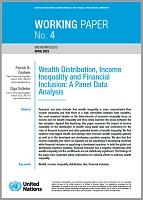
Research and data indicate that wealth inequality is more concentrated than income inequality and that there is a high correlation between both variables.
Yet, most empirical studies on the determinants of economic inequality focus on income and not wealth inequality and they rarely examine the nexus between the two variables.
Against this backdrop, this paper examines the impact of income inequality on the distribution of wealth using panel data and controlling for the roles of financial inclusion and other potential drivers of wealth inequality.
We find evidence that lagged wealth and savings rates increase wealth inequality globally as well as in the developed and developing countries samples.
We also find that income inequality and return on deposits are dis-equalizing in developing countries while financial inclusion is equalizing in developed countries.
In both the global and developing countries samples, financial inclusion has a negative relationship with wealth inequality, but the coefficients are not statistically significant.
The findings of the paper have important policy implications for national efforts to address wealth inequality.
The findings, interpretations and conclusions expressed in this document are those of the author(s) and do not necessarily reflect the views of the United Nations or its officials or Member States.
The designations employed and the presentation of material on any map in this work do not imply the expression of any opinion whatsoever on the part of the United Nations concerning the legal status of any country, territory, city, or area or of its authorities, or concerning the delimitation of its frontiers and boundaries.


